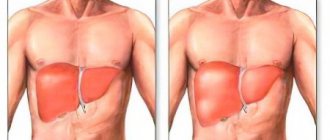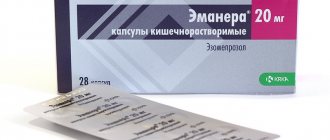Loperamide-Akrikhin
Registration number: P N001229/01 Trade name of the drug: Loperamide-Akrikhin
International nonproprietary name: loperamide
Dosage form: capsules
Composition: 1 capsule contains: active substance - loperamide hydrochloride 2 mg, excipients: lactose (milk sugar), corn starch, colloidal silicon dioxide (Aerosil), talc, magnesium stearate. Capsule composition: titanium dioxide, quinoline yellow dye, sunset yellow dye, gelatin.
Description: Capsules No. 4 are yellow. The contents of the capsules are white or white-yellowish powder.
Pharmacotherapeutic group: antidiarrheal agent. ATX code: A07DA03.
pharmachologic effect
Pharmacodynamics Loperamide, by binding to opioid receptors of the intestinal wall (stimulation of choline and adrenergic neurons through guanine nucleotides), reduces the tone and motility of intestinal smooth muscles (due to inhibition of the release of acetylcholine and prostaglandins). Slows down peristalsis and increases the transit time of intestinal contents. Increases the tone of the anal sphincter, promotes fecal retention and reduces the urge to defecate. The action develops quickly and lasts 4-6 hours.
Pharmacokinetics When taken orally, absorption is 40%. Maximum plasma concentration is achieved 2.5 hours after taking the capsules. Bonding with plasma proteins (mainly albumin) is 97%. Does not penetrate the blood-brain barrier. Almost completely metabolized by the liver by conjugation. The half-life is 9-14 hours (average 9.8 hours). It is excreted mainly in bile, a small part is excreted by the kidneys (in the form of conjugated metabolites).
Indications for use Symptomatic treatment of acute and chronic diarrhea of various origins (allergic, emotional, drug, radiation, with changes in diet and quality food composition, with metabolic and absorption disorders, as an adjuvant for diarrhea of infectious origin). Regulation of bowel movements in patients with ileostomy.
Contraindications Hypersensitivity, intestinal obstruction, acute ulcerative colitis, diverticulosis, diarrhea due to acute pseudomembranous enterocolitis, dysentery and other gastrointestinal infections. Pregnancy (1st trimester), lactation period, children under 2 years of age (Loperamide-Akrikhin capsules are not prescribed to children under 6 years of age).
With caution: Liver failure.
Directions for use and dosage: Take orally, without chewing, with water. For acute diarrhea, adults are initially prescribed 2 capsules (4 mg) of Loperamide-Akrikhin, then 1 capsule (2 mg) after each bowel movement in case of loose stools. The highest daily dose is 8 capsules (16 mg). For chronic diarrhea, adults are prescribed 4 mg/day. The maximum daily dose is 16 mg. For acute diarrhea, children over 6 years of age are prescribed an initial dose of 2 mg, then 2 mg after each bowel movement in case of loose stools. The maximum daily dose is 4 capsules (8 mg). For chronic diarrhea, children over 6 years of age are prescribed Loperamide-Akrikhin in a daily dose of 2 mg. The maximum daily dose is 6 mg per 20 kg. After normalization of stool or in the absence of stool for more than 12 hours, the drug should be discontinued.
Side effects Observed, as a rule, only with long-term use of the drug. Possible allergic reactions (skin rash), drowsiness, dizziness, hypovolemia, electrolyte disturbances, dry mouth, intestinal colic, gastralgia, abdominal pain or discomfort, nausea, vomiting, flatulence. Rarely - urinary retention, extremely rarely - intestinal obstruction.
Overdose Symptoms: signs of depression of the function of the central nervous system (stupor, impaired coordination of movements, drowsiness, constriction of the pupils (miosis), increased skeletal muscle tone, respiratory depression), intestinal obstruction. Treatment: Naloxone is used as a specific antidote. Considering that the duration of action of Loperamide-Akrikhin is longer than that of naloxone, repeated administration of the latter is possible. Symptomatic treatment: gastric lavage, taking activated carbon (in the first 3 hours after taking the drug), artificial ventilation.
Special instructions If there is no effect after 2 days of using Loperamide-Akrikhin®, it is necessary to clarify the diagnosis and exclude the infectious genesis of diarrhea. Children under 6 years of age are not recommended to take capsules. If constipation or bloating develops during treatment, Loperamide-Akrikhin should be discontinued. In patients with impaired liver function, careful monitoring for signs of toxic damage to the central nervous system is necessary. During the treatment of diarrhea, it is necessary to replace the loss of fluid and electrolytes. During treatment, care must be taken when driving vehicles and engaging in other potentially hazardous activities that require increased concentration and speed of psychomotor reactions.
Release form Capsules 2 mg. 10 capsules per blister pack. 1 or 2 blister packs along with instructions for use are placed in a cardboard pack.
Storage conditions: In a dry place, protected from light, at a temperature not exceeding 25 °C. Keep out of the reach of children.
Shelf life: 4 years. Do not use the drug after the expiration date.
Conditions for dispensing from pharmacies Without a prescription.
Manufacturer/Organization accepting consumer complaints: Open Joint-Stock Company Chemical and Pharmaceutical Plant AKRIKHIN (JSC AKRIKHIN), Russia 142450, Moscow region, Noginsky district, Staraya Kupavna, st. Kirova, 29. Phone/fax
Loperamide Akri
Release form, composition and packaging
Hard gelatin capsules, green, No. 4; the contents of the capsules are white or white powder with a yellowish tint.
1 caps. loperamide hydrochloride 2 mg
Excipients: lactose, corn starch, aerosil (colloidal silicon dioxide), talc, magnesium stearate.
Clinical and pharmacological group: Antidiarrheal symptomatic drug
pharmachologic effect
Loperamide, by binding to opioid receptors of the intestinal wall (stimulation of choline and adrenergic neurons through guanine nucleotides), reduces the tone and motility of intestinal smooth muscles (by inhibiting the release of acetylcholine and Pg).
Slows down peristalsis and increases the transit time of intestinal contents.
Increases the tone of the anal sphincter, promotes fecal retention and reduces the urge to defecate. The action develops quickly and lasts 4-6 hours.
Indications
- diarrhea (acute and chronic of various origins: allergic, emotional, medicinal, radiation; with changes in diet and quality of food, with metabolic and absorption disorders).
- regulation of stool in patients with ileostomy. As an auxiliary drug - diarrhea of infectious origin.
Dosage regimen
Inside (capsules - without chewing, with water; lingual tablet - on the tongue, within a few seconds it disintegrates, after which it is swallowed with saliva, without water).
For acute diarrhea, adults are prescribed an initial dose of 4 mg; then - 2 mg after each act of defecation (in the case of liquid stool); the highest daily dose is 16 mg.
When prescribed in drops: initial dose - 60 drops of 0.002% solution; then 30 drops after each bowel movement; maximum dose - 180 drops/day (6 times).
For chronic diarrhea, adults are prescribed 4 mg/day.
The maximum daily dose is 16 mg. For acute diarrhea, children over 5 years of age are prescribed an initial dose of 2 mg, then 2 mg after each act of defecation; the maximum daily dose is 8 mg. Drops: initial dose - 30 drops of 0.002% solution; then 30 drops 3 times a day; maximum dose - 120 drops/day (in 4 doses). For chronic diarrhea, children over 5 years of age are prescribed loperamide in a daily dose of 30 drops or 2 mg.
Children aged 2-5 years are prescribed in an oral solution of 5 ml (1 measuring cap) per 10 kg; frequency of administration - 2-3 times a day.
The maximum daily dose is 6 mg per 20 kg. If normal stool appears or if there is no stool for more than 12 hours, the drug is discontinued.
Side effect
Allergic reactions (skin rash), drowsiness, dizziness, hypovolemia, electrolyte disturbances; dry mouth, intestinal colic, gastralgia, abdominal pain or discomfort, nausea, vomiting, constipation, flatulence.
Rarely - urinary retention, extremely rarely - intestinal obstruction.
When taking lozenges, there is a burning or tingling sensation in the tongue.
Contraindications
- hypersensitivity,
- intestinal obstruction,
- acute ulcerative colitis,
- diverticulosis,
- diarrhea due to pseudomembranous enterocolitis,
- dysentery and other gastrointestinal infections;
- pregnancy (first trimester),
- lactation period,
- children's age (up to 2 years, for capsules 6 years).
With caution. Liver failure.
Pregnancy and lactation
The use of the drug is contraindicated in the first trimester and during lactation.
special instructions
If there is no effect after 2 days of treatment, it is necessary to clarify the diagnosis and exclude the infectious genesis of diarrhea.
Children under 5 years of age are not recommended to take capsules. If constipation or bloating develops during treatment, loperamide should be discontinued.
In patients with impaired liver function, careful monitoring for signs of toxic damage to the central nervous system is necessary.
During the treatment of diarrhea, it is necessary to replace the loss of fluid and electrolytes.
During the treatment period, care must be taken when driving vehicles and engaging in other potentially hazardous activities that require increased concentration and speed of psychomotor reactions.
Overdose
Symptoms: central nervous system depression (stupor, impaired coordination of movements, drowsiness, miosis, muscle hypertension, respiratory depression), intestinal obstruction.
Treatment: antidote - naloxone; Given that the duration of action of loperamide is longer than that of naloxone, repeated administration of the latter is possible.
Symptomatic treatment, activated carbon, gastric lavage, mechanical ventilation.
Drug interactions
Opioid analgesics increase the risk of developing severe constipation.
Storage conditions and periods
In a dry place, protected from light, at a temperature not exceeding 25 °C.
Shelf life: 4 years.
Loperamide instructions: from what
The prescription of the drug is not always associated with the onset of diarrhea, although it is the main indication. If stool disorder occurs due to a reaction to taking medications, you should take Loperamide, which will stop the rapid movement of food through the intestines, and along with it, the medication taken.
This will allow the active substances not to be evacuated through the anus, but to remain in the intestine in order to have time to be absorbed into the blood and provide the expected therapeutic assistance. Diarrhea is often caused by taking antibiotics. If the patient takes antibacterial drugs, and they, along with frequent loose stools, immediately leave the body, no treatment will work. Therefore, diarrhea caused by taking medications is the first indication for prescribing Loperamide.
In addition, the drug is indicated for use in case of metabolic disorders. In this case, the patient, no matter how much he eats, does not gain weight, does not receive enough nutrients, as a result of which the body is rapidly depleted. Loperamide allows food to stay in the intestines, and vitamins and minerals to be absorbed through its walls.
If the patient has had surgery to remove the end of the intestine through an opening in the abdominal cavity, Loperamide may be prescribed to reduce the frequency of bowel movements and also allow food to remain in the lumen, which is especially important for those patients whose intestinal length has been significantly reduced as a result of the operation .
What is loperamide used for?
The drug is aimed at getting rid of an attack of diarrhea. It works as follows: the active substance, entering the intestines, begins its effect on its muscles and ability to contract. As a result, taking Loperamide stops bowel activity while simultaneously increasing the tone of the anal sphincter, so that loose stool cannot be released uncontrollably from the rectum. An inactive state of the intestines, close to paralysis, allows food to have time to be absorbed into the bloodstream and slowly move towards the exit.
Loperamide in what doses should I take?
Most often, taking Loperamide is episodic in nature - during an attack of diarrhea. In case of acute stool disorder, take two tablets, which equals 4 mg of the active substance. If symptoms persist, repeat dosage is reduced to 1 tablet, but not earlier than 3 hours after taking the first two.
For chronic diarrhea, taking the drug can continue until the unpleasant symptom disappears. It is important to remember that you should not exceed the daily dose of 16 mg, which is equal to 8 tablets.
Can I take Loperamide during pregnancy?
Diarrhea that occurs during pregnancy should not become a reason to decide on self-medication. First of all, it is necessary to examine a pregnant woman for the presence of an intestinal infection. Then it is important to evaluate her diet in order to draw conclusions about the need to adjust the menu. If diarrhea is not the result of serious gastrointestinal disorders, Loperamide may be approved for use provided that the pregnancy is not in the first trimester.
How to take Loperamide for diarrhea
First of all, it is important to understand the etiology of diarrhea. If diarrhea occurs due to excitement, or during a trip that provokes tourist syndrome, Loperamide will come in handy. The tablet must be taken immediately after defecation. That is, if there is a feeling that a bowel movement is about to occur, the feces should be allowed to come out, and then immediately take the drug. Loperamide will stop the bowels and strengthen the anal sphincter. If you do not allow a portion of feces to escape, intoxication may occur.
In case of poisoning, taking Loperamide is not justified, since the drug is not a sorbent and does not help stop the absorption of toxic substances into the blood. Instead, it will simply cause the intestines to freeze, and given the fact that there is low-quality food inside it, which caused diarrhea, the patient’s condition will only worsen, since the toxic substances will remain inside the gastrointestinal tract.





